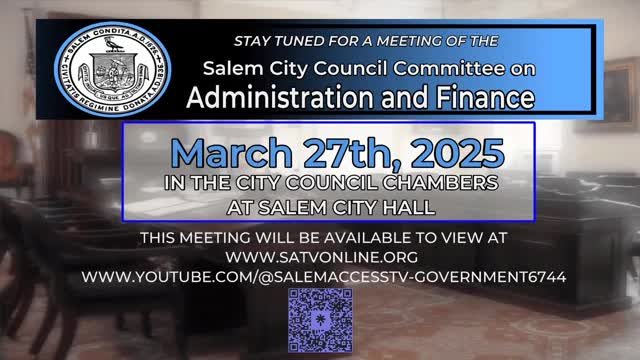Salem committee pauses $25,000 appropriation for H5N1 wastewater surveillance
Get AI-powered insights, summaries, and transcripts
Subscribe
Summary
The Salem City Administration and Finance Committee voted 5-0 on March 27 to leave a $25,000 appropriation request for one year of wastewater surveillance for H5N1 (avian influenza) in committee for further review and referral to the Board of Health.
The Salem City Administration and Finance Committee on March 27 voted to table consideration of a $25,000 appropriation to fund one year of wastewater surveillance for highly pathogenic avian influenza (H5N1).
Health Agent Dave Greenbaum told the committee the appropriation would pay BioBot Analytics to add H5N1 testing to the city’s existing wastewater sampling program for one year. “We are requesting the $25,000 appropriation to conduct wastewater surveillance for avian influenza. We think this is a proactive approach to check to make sure that we don't have, you know, bird flu in our community at this time,” Greenbaum said.
The surveillance would augment BioBot’s current COVID testing of Salem’s wastewater; Greenbaum said the COVID testing is paid for by the Massachusetts Department of Public Health and that adding avian-flu testing would be the city’s expense. He described the effort as an early-detection tool: “I think one of the simplest ways for us to be able to detect if we have a transmission from animal to human…is through wastewater surveillance.”
Committee members pressed on several issues, especially budget timing and local testing capacity. Councilor Stott said he supported the idea of proactive surveillance but raised concerns about spending during budget season and asked for a broader conversation about testing priorities. “I don't know that I can justify that personally right now given the lack of data…if the city would want to reintroduce a requirement to register birds and other farm animals, I would be supportive of that,” Stott said.
Councilor Watsonfeld asked about testing of animals and whether the city keeps a registry of domestic fowl; Greenbaum said Salem does not maintain a chicken registry and animal testing would be performed by state or federal laboratories. Andy Varela, who said he co-owns Maitland Mountain Farm and keeps about 150 laying hens in Salem, urged registration and said he would cooperate with the health department: “If it was up to me… I would be more than happy to be in compliance with the health department on our birds.”
Patty Marcello, who identified herself as a Board of Health liaison during the early COVID response, asked whether the board had formally discussed the request; Greenbaum said he had briefed the Board of Health and it was generally supportive but agreed to bring the matter back for a fuller discussion.
Greenbaum and committee members also noted recent federal reductions in public-health funding and the effect those cuts could have on testing programs. Greenbaum said he anticipated fewer federal and state resources for some public-health testing going forward and described wastewater surveillance as a way to gain early warning if human transmission appeared locally; he also offered an opinion the committee members attributed directly to him: “I, unfortunately, I think bird flu might be our next pandemic.”
After discussion, Councilor Stott made a motion to leave the appropriation in committee for further consideration and referral to the Board of Health; the motion was seconded by Councilor Watsonfeld. The committee chair, Chair Merkle, recorded that five members voted in favor of leaving the matter in committee. Greenbaum said he could place the item on the Board of Health agenda (the board meets the second Tuesday of each month), and committee members asked staff to return with more data and a Board of Health recommendation.
The item will be considered further by staff and the Board of Health; no city funds were committed at the March 27 meeting.
